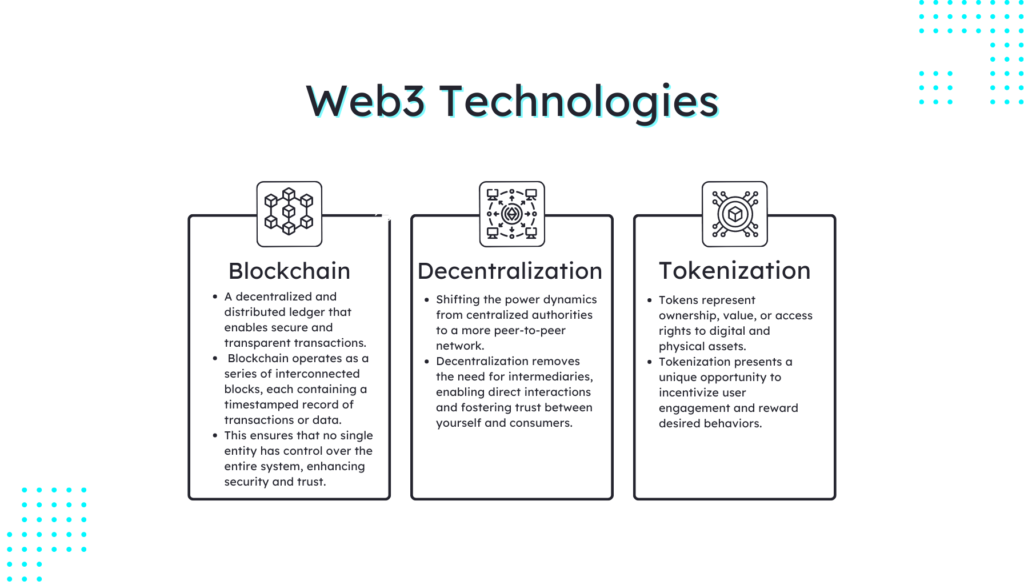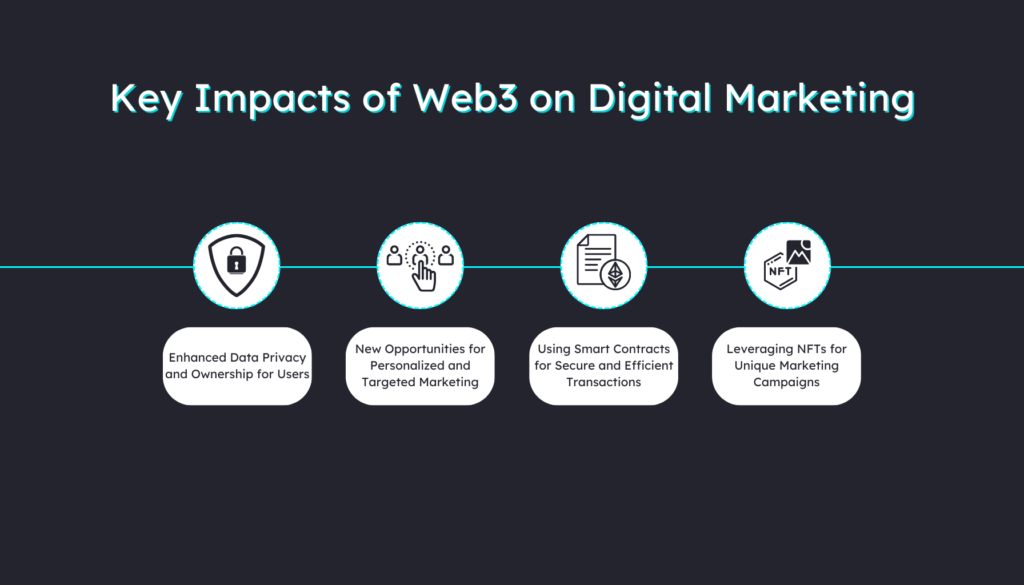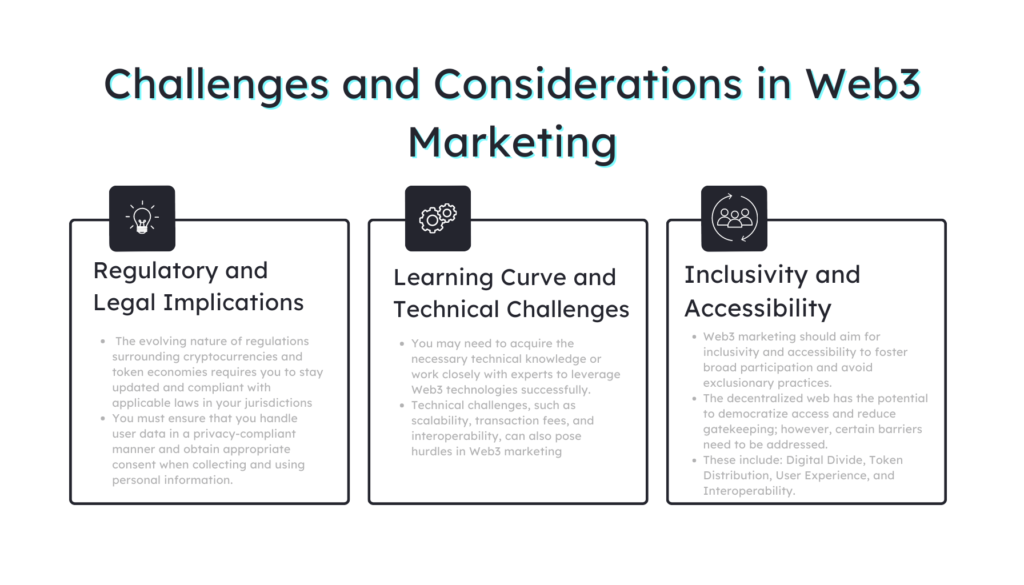
The advent of Web3 has emerged as a transformative force with the potential to revolutionize traditional marketing strategies.
Web3, also known as the decentralized web, represents a paradigm shift from the centralized systems that currently dominate the digital realm. It leverages the power of blockchain, a distributed ledger technology that ensures trust, transparency, and immutability. By removing intermediaries and establishing a peer-to-peer network, Web3 empowers individuals and communities, granting them greater control over their data and online experiences.
Traditional digital marketing strategies have long relied on centralized platforms, often plagued by issues such as data breaches, lack of transparency, and limited user control. However, with the advent of Web3, marketers have the opportunity to transcend these limitations and forge new paths toward more secure, engaging, and personalized marketing approaches.
Throughout this article, we’ll explore the core components of Web3, and how these elements redefine the relationship between brands and consumers, offering enhanced data privacy and ownership rights to individuals.
Evolution of Digital Marketing
Traditional digital marketing strategies have played a pivotal role in the growth of online businesses over the past few decades. These strategies encompass a range of tactics aimed at reaching and engaging target audiences through digital channels. Some of the key traditional digital marketing strategies include:
- Search Engine Optimization (SEO)
- Pay-Per-Click Advertising (PPC)
- Social Media Marketing
- Content Marketing
- Email Marketing
While traditional digital marketing strategies have proven effective, they are not without limitations and challenges, particularly in the centralized web environment. You encounter several key challenges, including:
- Lack of Data Privacy and Control: In the centralized web, user data is often collected and controlled by centralized platforms, leaving you with limited control over customer data and potentially exposing sensitive information to privacy breaches.
- Trust and Transparency Issues: Centralized platforms may lack transparency, making it difficult for you and your users to verify the accuracy and authenticity of data, metrics, and advertising practices. This can undermine trust between brands and consumers.
- Ad Fraud and Click Fraud: The centralized web is susceptible to ad fraud, where illegitimate activities artificially inflate ad impressions or clicks, wasting marketing budgets. Advertisers often struggle to combat fraudulent practices and ensure their ad spend delivers genuine engagement.
- Ad Blockers and Ad Fatigue: The rise of ad blockers and ad fatigue among users poses a challenge for you. As users become more selective in their online experiences, traditional display ads may struggle to capture attention or even be completely blocked from view.
- Limited Targeting Precision: While traditional digital marketing strategies offer targeting capabilities, they often rely on demographic or behavioral data provided by centralized platforms. This can result in limited precision and may not fully capture the nuanced interests and preferences of individual users.
Understanding Web3 Technologies
Blockchain and its Role in Web3
At the heart of Web3 lies blockchain technology, a decentralized and distributed ledger that enables secure and transparent transactions. Blockchain operates as a series of interconnected blocks, each containing a timestamped record of transactions or data. The decentralized nature of blockchain ensures that no single entity has control over the entire system, enhancing security and trust.
In Web3, blockchain technology revolutionizes digital marketing by providing a tamper-resistant and auditable record of transactions and interactions. It enables you to validate and verify data, ensuring the accuracy and authenticity of metrics and user engagement. Blockchain also offers enhanced data security, as information is stored across multiple nodes rather than a single central server, reducing the risk of data breaches.
Decentralization and its Impact on Trust and Transparency in Marketing
Decentralization is a key principle of Web3, shifting the power dynamics from centralized authorities to a more peer-to-peer network. In the centralized web, you and your users often rely on intermediaries for transactions, data storage, and verification. However, in Web3, decentralization removes the need for intermediaries, enabling direct interactions and fostering trust between yourself and consumers.
Decentralization enhances trust and transparency in marketing by eliminating a single point of failure and making the system more resilient to manipulation or fraud. You can leverage decentralized technologies to provide verifiable proof of engagement and performance metrics, instilling confidence in their campaigns. Additionally, users gain greater control over their data and can choose to share it securely and selectively, building trust with brands that respect their privacy preferences.
Tokenization and its Potential for Incentivizing User Engagement
Tokenization, a fundamental concept in Web3, involves the creation and use of digital tokens on blockchain networks. Tokens represent ownership, value, or access rights to digital and physical assets. In the context of digital marketing, tokenization presents a unique opportunity to incentivize user engagement and reward desired behaviors.
By tokenizing elements of marketing campaigns, such as content sharing, referrals, or participation in surveys, you can create token-based economies that encourage active user involvement. Users earn tokens for their contributions, which can be exchanged for various rewards, exclusive content, or even digital assets like NFTs (Non-Fungible Tokens). Tokenization enhances user engagement, as individuals are motivated by the tangible rewards associated with their interactions, leading to increased brand loyalty and advocacy.
Tokenized systems also introduce new monetization models for content creators, influencers, and consumers. For example, micro-transactions facilitated by tokens allow users to pay for small increments of access or content, enabling a fairer compensation structure for creators while enhancing the overall value exchange within the marketing ecosystem.

Key Impacts of Web3 on Digital Marketing
Enhanced Data Privacy and Ownership for Users
One of the significant impacts of Web3 on digital marketing is the enhanced data privacy and ownership it offers to users. In the centralized web, user data is often collected, stored, and controlled by centralized platforms, raising concerns about data security and privacy breaches. However, Web3 technologies, such as blockchain and decentralized storage, empower individuals with greater control over their data.
With Web3, users can have ownership of their data and choose how and when it is shared. Smart contracts and cryptographic protocols enable users to provide access to specific data elements while keeping the rest private. This shift towards user-centric data ownership and control builds trust between yourself and consumers, fostering more transparent and consensual data exchange.
New Opportunities for Personalized and Targeted Marketing
Web3 unlocks new opportunities for personalized and targeted marketing, allowing you to tailor your strategies to individual user preferences and interests. Through blockchain-based identity solutions, users can maintain self-sovereign identities, selectively sharing relevant information. This enables you to deliver more personalized experiences and targeted campaigns that resonate with specific user segments.
Tokenized systems in Web3 also enable you to incentivize user engagement and reward desired behaviors. By offering tokens for actions like content sharing, referrals, or feedback, you can create personalized incentives that foster deeper connections with users. These personalized and token-driven approaches to marketing empower individuals to actively participate and engage with brands on their own terms.
Using Smart Contracts for Secure and Efficient Transactions
Web3 introduces smart contracts, self-executing contracts with predefined rules and conditions encoded on the blockchain. Smart contracts enable secure and efficient transactions without the need for intermediaries, reducing costs, and eliminating the risk of fraud. In the context of digital marketing, smart contracts can streamline various processes, such as influencer collaborations, affiliate marketing, or reward distribution.
You can use smart contracts to automate payment processes, ensuring timely and transparent compensation for influencers or content creators. Additionally, smart contracts can facilitate seamless cross-border transactions and provide verifiable proof of engagement, enhancing trust between yourself and your partners.
Leveraging NFTs for Unique Marketing Campaigns
Non-Fungible Tokens (NFTs) have gained significant attention in the Web3 space, offering unique digital assets that can represent ownership of digital or physical items. NFTs present exciting opportunities to create unique and engaging marketing campaigns.
You can leverage NFTs to create limited-edition digital collectibles, virtual experiences, or exclusive access to content, thereby increasing brand visibility and fostering brand loyalty. NFTs enable you to tap into the growing trend of digital ownership and provide memorable and valuable experiences to your audiences. By integrating NFTs into marketing campaigns, brands can create a sense of scarcity, exclusivity, and personal connection that resonates with their target market.
The Rise of Decentralized Social Media Platforms

Web3 has ushered in a new wave of decentralized social media platforms that prioritize user control, privacy, and community governance. These platforms leverage blockchain technology and decentralized protocols to provide users with greater ownership and autonomy over their social media experiences.
Web3-based social media platforms offer several benefits. Firstly, they provide an environment that promotes transparency and trust between users and brands. The decentralized nature of these platforms ensures that user data is owned and controlled by individuals, granting you access to more reliable and authentic data. This empowers you to build more accurate audience profiles, tailor messaging, and deliver targeted campaigns with a higher level of precision.
Secondly, decentralized social media platforms often incentivize active user participation through token economies. Users can earn tokens for creating content, engaging with others, or contributing to the platform’s ecosystem. This incentivization mechanism fosters a vibrant and engaged user base, providing more opportunities to collaborate with influencers and brand advocates who genuinely believe in your product or service.
Additionally, decentralized social media platforms often prioritize privacy and data protection, addressing the growing concerns of users on the centralized web. This focus on privacy enhances user trust, leading to more meaningful interactions between you and your target audiences.
Community-Driven Marketing and User-Generated Content
Decentralized social media platforms foster community-driven marketing and user-generated content, revolutionizing the way brands engage with their audiences. These platforms empower communities to take an active role in shaping the direction of the platform, including its rules, content policies, and even governance structures.
You can tap into the power of community-driven marketing by actively engaging with communities, seeking feedback, and involving users in the decision-making process. This co-creation approach not only builds a sense of ownership among users but also strengthens brand loyalty and advocacy.
User-generated content (UGC) plays a pivotal role in decentralized social media platforms. UGC allows users to become active contributors to the platform’s content ecosystem, sharing their creativity and experiences. You can harness the potential of UGC by encouraging users to create content related to your brand, products, or campaigns. This form of authentic content resonates with audiences and has the potential to go viral, amplifying brand reach and engagement.
Community-driven marketing and UGC on decentralized social media platforms provide you with valuable insights into user preferences, trends, and emerging topics. By actively listening to the community and analyzing user-generated content, you can refine your strategies, identify new opportunities, and create content that truly resonates with your target audience.
As decentralized social media platforms continue to gain traction, it’s time to explore these new frontiers of community-driven marketing and UGC. By embracing the principles of decentralization and empowering users as active participants, you can forge stronger connections, foster brand loyalty, and tap into the creative potential of your communities.
Web3 and Influencer Marketing
Web3 technology has opened up exciting collaboration opportunities between influencers and brands, transforming the landscape of influencer marketing. Influencers, who have built dedicated followings and established personal brands, can leverage Web3 to deepen their relationships with their audience and create new revenue streams.
In the Web3 space, influencers have the opportunity to align themselves with brands that share their values and missions. The decentralized nature of Web3 platforms allows influencers to have more control over the partnerships they enter into, ensuring authentic and meaningful collaborations. Influencers can choose to work with brands that align with their personal beliefs and principles, leading to more genuine endorsements and fostering deeper connections with their audience.
Web3 introduces tokenized economies that incentivize user engagement and reward desired behaviors. Influencers can leverage these tokenized systems to create unique campaigns where their followers can actively participate. For example, influencers can collaborate with brands to launch token-based loyalty programs or exclusive access tokens that provide special benefits to their most engaged followers. This creates a mutually beneficial ecosystem where both influencers and brands can deepen audience engagement and loyalty.

Challenges and Considerations in Web3 Marketing
Web3 marketing presents a new frontier with unique challenges and considerations. As marketers navigate the decentralized landscape, they must be mindful of the following factors:
Regulatory and Legal Implications
Web3 technologies, such as blockchain and cryptocurrencies, bring forth regulatory and legal considerations that need to be addressed. The evolving nature of regulations surrounding cryptocurrencies and token economies requires you to stay updated and compliant with applicable laws in your jurisdictions. Compliance with anti-money laundering (AML) and know-your-customer (KYC) regulations may be necessary when engaging in token sales or using blockchain-based platforms.
Additionally, data privacy regulations, such as the General Data Protection Regulation (GDPR), still apply in the Web3 space. You must ensure that you handle user data in a privacy-compliant manner and obtain appropriate consent when collecting and using personal information. Understanding the legal landscape and working closely with legal advisors is crucial to navigating the complex regulatory environment in Web3 marketing.
Overcoming the Learning Curve and Technical Challenges
Web3 marketing introduces new technologies and concepts that require you to overcome a learning curve. Understanding blockchain technology, smart contracts, token economies, and decentralized platforms is essential for effective implementation. You may need to acquire the necessary technical knowledge or work closely with experts to leverage Web3 technologies successfully.
Technical challenges, such as scalability, transaction fees, and interoperability, can also pose hurdles in Web3 marketing. Blockchain networks may experience congestion or high gas fees, impacting the efficiency and affordability of transactions. You should stay updated on technological advancements, explore layer-2 solutions, and consider the trade-offs between decentralized systems and scalability requirements.
Ensuring Inclusivity and Accessibility in Web3 Marketing Initiatives
Web3 marketing should aim for inclusivity and accessibility to foster broad participation and avoid exclusionary practices. The decentralized web has the potential to democratize access and reduce gatekeeping; however, certain barriers need to be addressed. These include:
Digital Divide: Ensuring that Web3 platforms and token economies are accessible to individuals with varying levels of technological literacy and access to resources. Promoting user-friendly interfaces and educational materials can bridge the digital divide.
Token Distribution: Carefully designing token distribution mechanisms to avoid the concentration of wealth or power among early adopters. Implementing mechanisms that incentivize diverse participation can help create a more inclusive ecosystem.
User Experience: Simplifying and improving the user experience of Web3 applications and platforms. Streamlining processes, reducing transaction complexities, and enhancing overall usability can encourage broader adoption.
Interoperability: Promoting interoperability between different Web3 platforms to prevent fragmentation and siloed experiences. Open standards and protocols facilitate seamless interaction and inclusivity across the decentralized web.
By considering these challenges and actively working towards inclusivity and accessibility, you can ensure that your Web3 marketing initiatives are accessible to a wider audience and contribute to a more equitable and diverse ecosystem.
Conclusion
Web3 technology has revolutionized digital marketing strategies, offering enhanced data privacy and ownership for users, personalized and targeted marketing opportunities, secure transactions through smart contracts, and the rise of decentralized social media platforms. You now have the ability to build trust and transparency with your audiences, collaborate with influencers in authentic ways, incentivize engagement through tokenized systems, and foster community-driven marketing with user-generated content.
By harnessing the benefits of Web3 technologies and adapting to the evolving landscape, you can leverage data privacy, personalization, and decentralized platforms to drive engagement, foster trust, and forge stronger relationships with your audiences in this new era of digital marketing.

